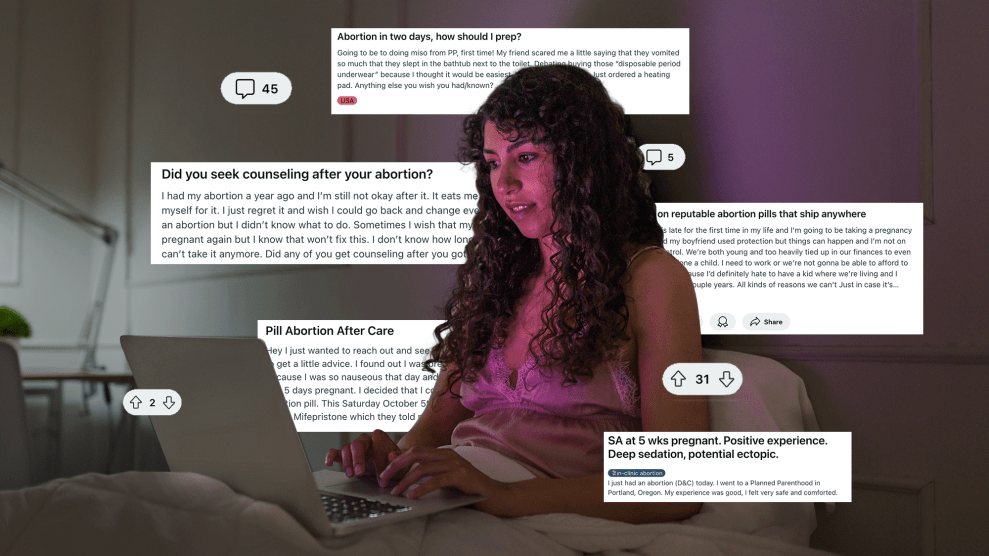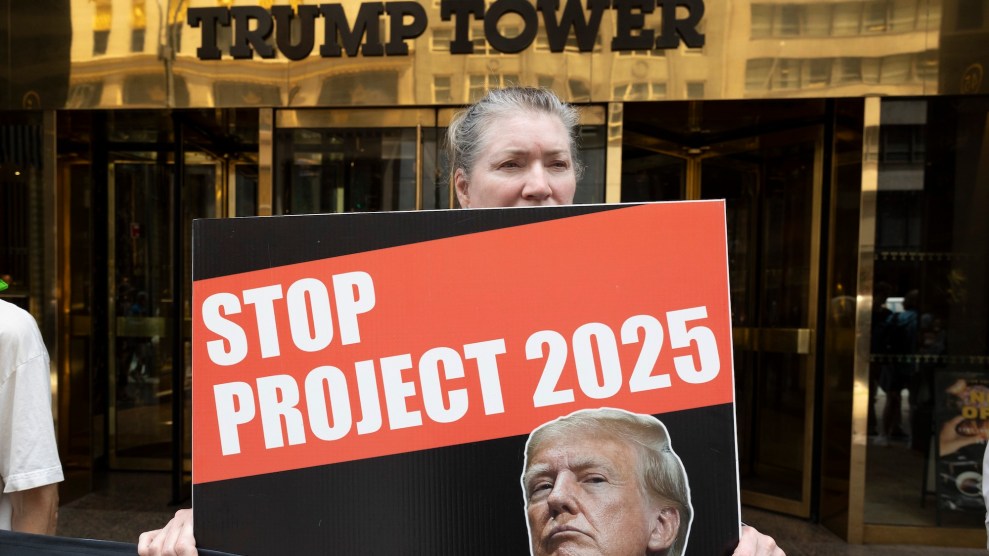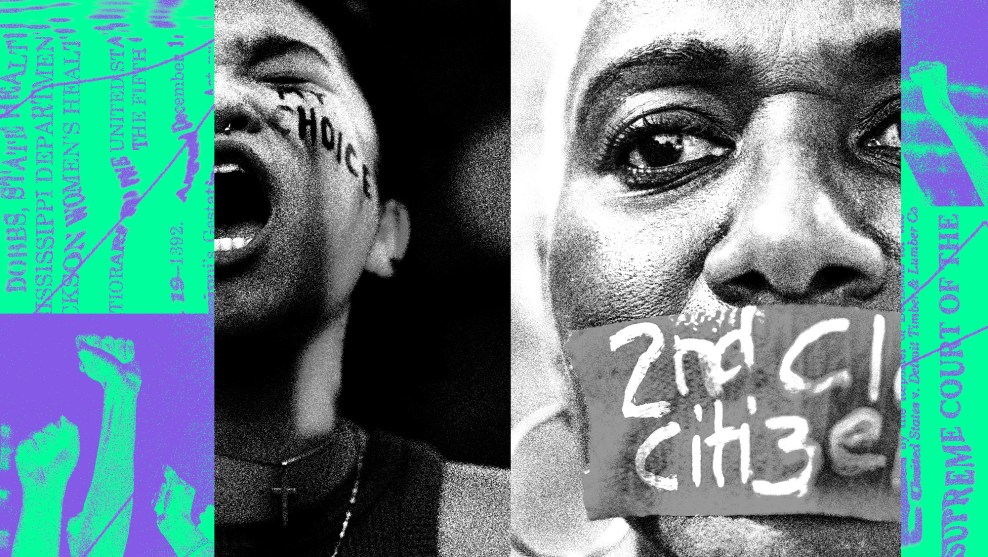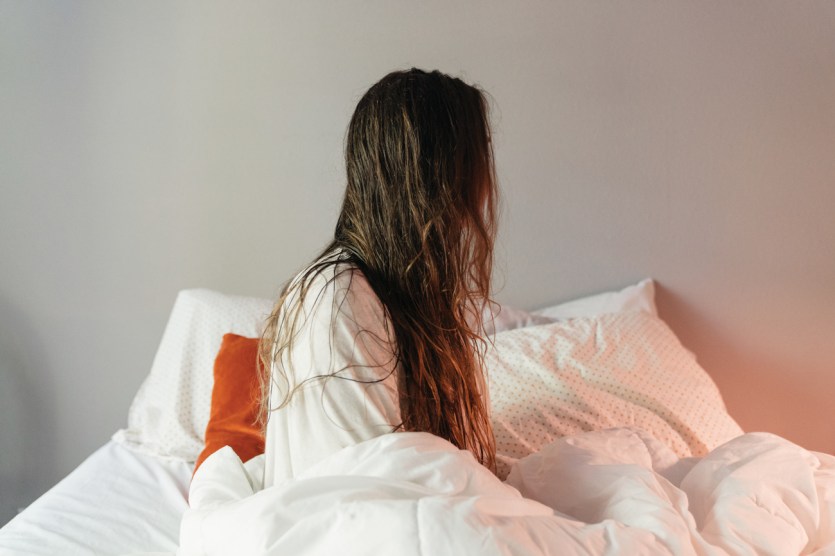
Mother Jones illustration; Getty
For some chronically ill and disabled people, the revolution will start from their rooms—or even from bed.
Since the fall of Roe v. Wade, the fight to protect abortion access has become even more urgent, with 13 states having banned procedural abortion outright. Maternal deaths rose by 56 percent in Texas after an abortion ban was enacted, and an August report by House Democrats on the Energy and Commerce Committee found that, since the Dobbs decision, more pregnant people have delayed seeking care for complications. And more people are being forced to carry pregnancies to term who don’t want to—which isn’t exactly harmless to a person’s body. Every year, at least 40 million people worldwide (out of around 140 million who give birth annually) develop a long-term health problem linked to childbirth.
Yet the end of Roe has had a unique impact on disabled people. Research has shown that disabled people die from pregnancy and birth complications at rates 11 times higher than non-disabled people. Women with disabilities, especially those with intellectual and developmental disabilities, are more likely to be sexually assaulted than non-disabled women, leading to more unwanted pregnancies.
“You don’t have to be a full-time activist in front of a camera at a rally in order to make a huge difference for someone.”
But the spate of bans has also led to new waves of abortion rights activism, including by disabled people. For those who experience chronic illnesses or a range of other disabilities, in-person activism isn’t always an option, especially with an ongoing pandemic—but there’s a powerful precedent for reproductive rights activism by disabled people.
Laurie Bertram Roberts, the executive director of the Mississippi Reproductive Freedom Fund, cares deeply about accessibility in part because they are disabled; from bed, they write grants and follow up with people who need assistance in abortion care to make sure their needs are met.
Former Mother Jones reporter Becca Andrews profiled Roberts and their fund’s work in 2019, when they faced down seemingly endless challenges even before the fall of Roe: “I don’t think [outsiders] understand that the structural barriers are at every turn of care,” Roberts said at the time. Now, as then, Roberts “spends much of her time bedbound due to painful fibromyalgia, but her phone and laptop are never far, basically operating as digital appendages.”
Roberts also hires workers who have their own experiences with chronic illnesses and disabilities—and encourages them to work in a way that is best for them, like taking flexible hours.
“A lot of us can get a whole lot done if people would just give us the opportunity to do it,” Roberts said.
The upside of taking reproductive rights activism online is that many people seeking abortions already turn to the internet for help. New York–based Ariella Messing, who lives with chronic migraines, saw how valuable that could be when she co-founded Online Abortion Resource Squad, which offers peer-based support. Messing and volunteers now run Reddit’s r/Abortion, where they answer questions for people seeking abortions around the world.
While running OARS is her full-time job as its executive director—and then some, with migraines interrupting some shifts—Messing has made volunteering for OARS accessible in multiple ways.
Helping someone learn how to safely get an abortion in their area can take just five minutes; as with OARS, it can be as simple as writing a comment on Reddit. “You don’t have to be a full-time activist in front of a camera at a rally in order to make a huge difference for someone,” Messing said.
But even among organizations that do put on events like rallies, there is still space for remote involvement, which Olivia Neal, a chronically ill communications staffer, does to help people have the information they need to get an abortion as part of her job at the ACLU of North Carolina.
Sustainable, accessible activism “takes a little extra people power.”
And the same challenges non-disabled activists face show up in force—like exhaustion and financial insecurity. Many people involved in the fight for reproductive rights don’t make a lot of money: Messing can’t afford good health insurance, and needs expensive medications. Lack of employer benefits, Messing said, was “the one thing holding me back at first from doing this full time—and that still is causing me trouble every single day.”
Avoiding overwork can be very hard when people need support, as Messing, who is usually logged into r/Abortion seven days a week, also knows. “It’s also really tiring to never be on autopilot,” she said. And despite accommodations to work remotely, Neal said, “I do feel that sense of guilt about not being able to always show up in physical spaces.”
Neal sees her main contribution as making information available and easily understandable: she created an abortion guide for those seeking one in North Carolina, including guidance on transportation and financial assistance. “We all bring different skills to the movement,” she said.
Ableism can mean even seasoned advocates aren’t not taken seriously; Roberts was previously pushed to step aside due to her disabilities. “Aside from the obvious ableism, I think that they missed the point that we are an important bloc of supporters.”
While the fight for abortion access is an important part of the battle for reproductive rights, it’s far from the only one. Even before the fall of Roe v. Wade, disabled people struggled to get accessible gynecological care: A 2018 study suggests that many gynecologists lack the training to give disabled people the equal treatment they need.
Mary Fashik, who has advocated for reproductive rights online as part of #UpgradeAccessibility, a movement she founded, experienced that firsthand. Fashik had an ovarian cyst burst, and when she finally had an appointment some days later, Fashik said she “could not get on the exam table because the exam table was not accessible.” Then and in general, Fashik felt that her white doctor was not taking her concerns seriously due to her race and disability. (Soon, fewer disabled people will experience this kind of inaccessible care: In August, the Justice Department finalized a rule mandating that medical diagnostic equipment, including examination tables, be accessible for people with disabilities.)
Fashik’s troubles helped lead her to organize online panels and events after Roe was overturned—“Online advocacy is real advocacy,” Fashik said—where she talked about birth control access and the forced sterilization of disabled people.
Sustainable, accessible activism “takes a little extra people power and or money,” Roberts notes. But it’s absolutely necessary for work like theirs, and the benefits outweighs the costs. “When we talk about access to care,” Roberts says, “we definitely have to talk about access to care for the disabled community.”
















